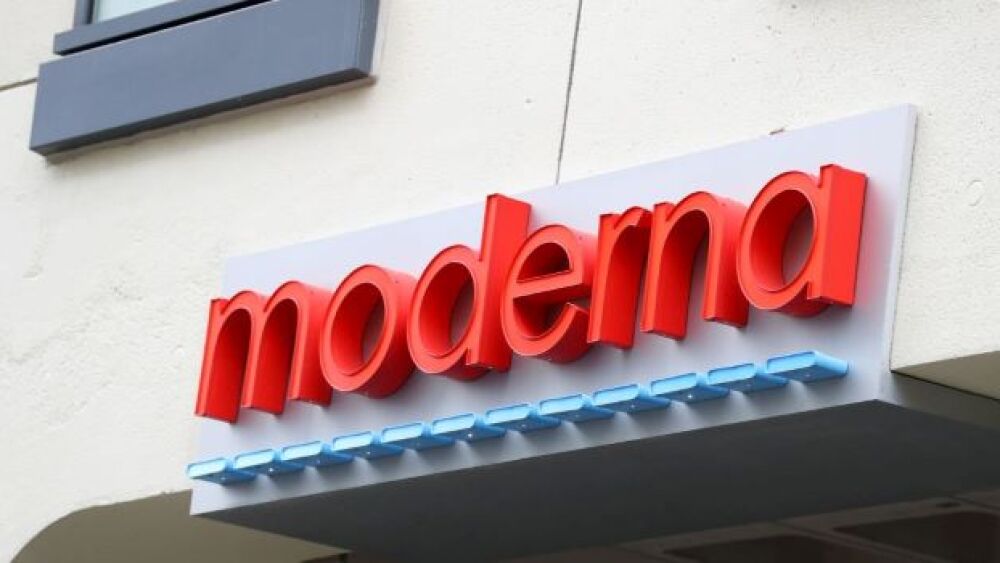Moderna announced it is filing lawsuits against Pfizer and BioNTech, alleging that the companies’ COVID-19 vaccine infringes patents covering its mRNA technology.
Maddie Meyer/Getty Images
Moderna laid down a gauntlet Friday, announcing it is filing lawsuits against Pfizer and BioNTech, alleging that the companies’ COVID-19 vaccine, Comirnaty, infringes patents it filed between 2010 and 2016 covering its mRNA technology.
Moderna will file the suits in the U.S. District Court for the District of Massachusetts and the Regional Court of Dusseldorf in Germany.
Moderna, along with Germany’s BioNTech, have been working on mRNA technology and vaccines for over a decade, well before the emergence of COVID-19. Pfizer partnered with BioNTech at the beginning of the pandemic to accelerate development and distribution of the vaccine.
“We are filing these lawsuits to protect the innovative mRNA technology platform that we pioneered, invested billions of dollars in creating and patented during the decade preceding the COVID-19 pandemic,” Moderna CEO Stéphane Bancel said in a statement. “This foundational platform, which we began building in 2010, along with our patented work on coronaviruses in 2015 and 2016, enabled us to produce a safe and highly effective COVID-19 vaccine in record time after the pandemic struck.”
The filing of the lawsuits also suggests the company is viewing the COVID-19 pandemic as having moved on to a different phase. In October 2020, Moderna agreed not to enforce its COVID-19-related patents while the pandemic was raging.
But it now says that as of March 2022, “when the collective fight against COVID-19 entered a new phase and vaccine supply was no longer a barrier to access in many parts of the world, Moderna updated its pledge.”
While Moderna continues to vow that it will not enforce its patents for the vaccine used in the 92 low- and middle-income countries in the GAVI COVAX Advance Market Commitment, it “expected companies such as Pfizer and BioNTech to respect its intellectual property rights and would consider a commercially reasonable license should they request one for other markets.” Those companies have failed to do so, Moderna stated.
Moderna stated is not attempting to remove Comirnaty from the market, nor seeking damages related to Pfizer’s sales to AMC 92 countries, or Pfizer’s sales to the U.S. government. It is also not seeking damages for activities that occurred before March 8, 2022.
Moderna is arguing that two key features of its technologies are critical to the success of mRNA vaccines. The company claims that neither Pfizer nor BioNTech had their experience with mRNA vaccines for infectious diseases and “knowingly followed Moderna’s lead in developing their own vaccine.”
Initially, Pfizer and BioNTech conducted clinical tests on four different vaccine candidates, which included ones that did not follow Moderna’s approach, Moderna noted in its statement. However, Pfizer and BioNTech “ultimately decided to proceed with the vaccine that has the same exact mRNA chemical modification to its vaccine as Spikevax (Moderna’s vaccine).” Moderna argues that it started developing this chemical modification in 2010 and first validated it in human studies in 2015.
Secondly, Moderna claims Pfizer and BioNTech copied its approach to encode for the full-length spike protein in an LNP formulation for a coronavirus. Moderna had been working on this approach several years earlier when the Middle East Respiratory Syndrome (MERS) outbreak occurred.
Moderna also stated that none of the patent rights it is seeking to enforce are related to any intellectual property created during its collaboration with the NIH to develop Spikevax. That collaboration began only after the patent technologies involved in these lawsuits were successful in clinical trials in 2015 and 2016.
The FDA granted Emergency Use Authorization to the Pfizer-BioNTech COVID-19 vaccine in December 2020, then one week later, granted the same to Moderna. The Spikevax vaccine is Moderna’s sole product, which so far this year, has earned the company $10.4 billion. This is compared to the $22 billion garnered by Pfizer-BioNTech’s Comirnaty.
COVID-19 Vaccines Entrenched in Lawsuits
The COVID-19 vaccines are now involved in numerous patent lawsuits. In July, Germany-based CureVac filed a lawsuit in a German court against BioNTech seeking “fair compensation for infringement… of CureVac’s intellectual property rights” tied to Comirnaty. Alnylam also alleged that Pfizer, BioNTech and Moderna infringed a newly obtained patent on the mRNA delivery system used in their COVID-19 vaccines.
In February, Arbutus Biopharma and GeneVant filed lawsuits against Moderna over patent infringement related to the refining lipid nanoparticle (LNP) delivery technology in addition to compositions and methods for their use.
Most of these patents refer to the LNP technology used to deliver the mRNA in the vaccines. Alnylam had originally sued the three companies in March. The July lawsuit came the same day the U.S. Patent and Trademark Office issued the patent.
Pfizer denied the March allegations, arguing that Alnylam understood the vaccine is “outside the scope of what [the company] actually invented.” Moderna, for its part, argued it was immune from Alnylam’s claims because it provided its vaccine under the U.S. government’s national vaccination program.





